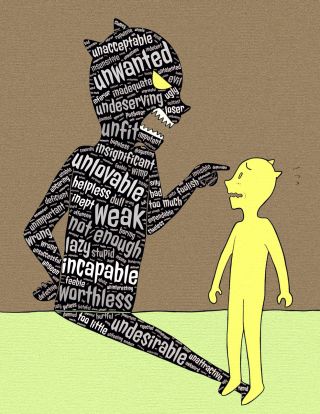Self-Talk
Are You Too Hard on Yourself?
The radical art of replacing self-criticism with self-compassion.
Updated September 4, 2023 Reviewed by Ray Parker
Key points
- 3 keys to work with the inner critic: recognize it, understand its motivations, challenge negative messages.
- Learn to gently notice when our inner critic operates by maintaining self-regulation and equanimity.
- A therapist can help us to understand the inner critic and develop strategies for coping with it.

I wish I had a nickel for every time I’ve heard one of my psychotherapy clients being self-critical. Perhaps you recognize a persistent tendency to judge and berate yourself. If so, you are not alone.
Why do we tend to be so critical of ourselves? How can we work with this destructive tendency and replace it with more kind and supportive self-talk?
It’s not a huge mystery where negative self-talk comes from. If our caregivers frequently shamed us for not being perfect—when we spilled the milk, said something silly, or when our grades slipped (in short, when we were being human)—we begin to internalize an inner critic that takes over the job from them. We’re poised to criticize ourselves for our looks, our smarts, our spoken words: “Why did you say (or do) that dumb thing? What will people think? You’d better get your act together—and fast!”
In addition to internalizing the critical voices from parents, teachers, and peers, we’re wired with a “negativity bias.” Over many centuries of evolution, if we got it wrong just once—if while hunting prey, we failed to notice the tiger behind a bush, we could end up being lunch rather than finding lunch.
Acceptance and Love
Nowadays, we’re little concerned about beasts in the wild, but very concerned about belonging—being accepted and loved. Human beings are pack animals. Our survival is at risk if we’re not part of the herd. The stray wildebeest is the one picked off by a hungry predator. As Abraham Maslow and many psychologists have pointed out, our need to belong is part of the hierarchy of human needs.
Becoming Mindful of Our Inner Critic
It is a huge step in our personal growth to recognize when our inner critic is operating. Oftentimes, we are so merged with this part of our psyche that we don’t even notice it; it's the background feeling we've learned to live with. We may experience life through the filter of critiques, which becomes multi-directional. That is, we’re poised to be critical of ourselves and others. Show me a person who tends to be very critical of others (think of certain politicians, for example), and I’ll show you a person who is secretly (or not-so-secretly) critical of themselves.
If you notice a tendency to judge and criticize others, see if you can have enough peripheral vision to notice the ways you pick at yourself—always trying to be perfect or only feeling worthy and valued when you can convince yourself that you’re better than others. Being arrogant or feeling superior are telltale signs that your inner critic is on the job.
The Positive Side of Our Inner Critic
As we catch on to the fact that we have an inner critic taking up real estate in our brains, our first impulse may be to banish it. But if you’ve tried this strategy, you may have discovered that it doesn’t work. Ironically, your inner critic may become more powerful if you try to suppress it.
The way out of this unseemly predicament may be counterintuitive. Rather than try to get rid of it, what if you recognize that your inner critic is really on your side—or is trying to be? For example, if our critic is saying, "You're a fat slob, you don't need that dessert," or, "If you don't exercise, you'll be a lazy couch potato and die young," our inner critic may be concerned about our health and well-being.
Inner Critic as Sledgehammer
Just as a critical parent probably wants their child to be successful and happy, though often going about it in an anxious and destructive way, our inner critic wants us to be healthy and happy. But the way it goes about trying to move us in a positive direction is counterproductive. Harsh criticism often makes us want to give up. We might get anxious, depressed, or exasperated, which fuels a cycle of ever-harsher self-criticisms—hoping that we’ll finally right the ship.
Rather than offering a gentle nudge or friendly reminder about a better way to live, our inner critic may take out the sledgehammer, assaulting us in a rather violent way to do its bidding. I'm reminded of the Chinese proverb, “Do not use a hatchet to remove a fly from your friend's forehead.”
Putting away the hatchet means replacing cruel and critical thoughts with a more kind and gentle way of talking to ourselves. Rather than succumbing to an onslaught of negative messages (“What’s wrong with you?” or, “You’ll never amount to anything”), what if we initiate a friendly dialogue with our inner critic: “I hear your concerns. I know you’re trying to move me in a positive direction, but it’s overkill. The way you’re speaking to me is only shutting me down, de-motivating me, and leading me to want to give up. I need you to find a more gentle, kind, and supportive way to speak to me. Let’s work together on this. I’m more likely to succeed if you give me a break and trust that I’m more likely to move forward in my life if you back off a little (or a lot) and know that I’m doing my best—and will continue to do so.”
Buddhist Psychology
In Buddhist psychology, there’s a story about Mara, the evil tempter, visiting the Buddha and barraging him will all kinds of criticisms and temptations. Rather than kicking him out, Buddha invites Mara in for tea: “Hello my old friend, how are you today?” The Buddha’s calm and empathic listening to Mara's concerns saps him of his animosity and he eventually leaves.
Similarly, if we can learn to gently notice when our inner critic is operating ("I see you, inner critic"), do our best to maintain self-regulation and equanimity, and hear what it's trying to tell us, we may take a step toward defusing its destructive way of jabbering at us.
There are many nuances involved in working with our inner critic in a manner where it loosens its destructive grip. Engaging with our inner critic in a constructive way is a lifelong process. The goal is not to eliminate it, but to translate its harsh messages in a way where they become more clear.
Working with a skilled therapist can be very helpful in getting some distance from that inner critic, hearing the ways it may be trying to protect us (even if it's misguided), and thereby freeing us to move forward in our lives.
To find a therapist, visit the Psychology Today Therapy Directory.
© John Amodeo




